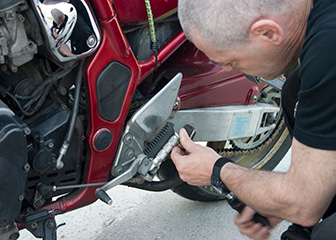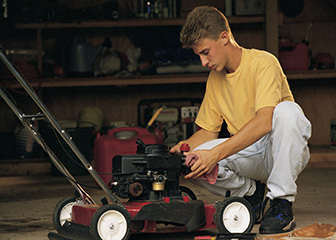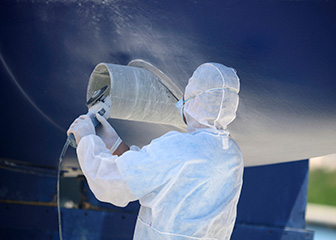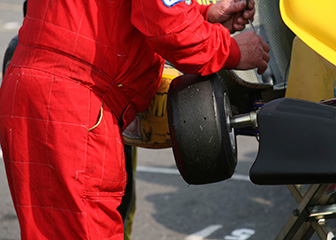
A small engine mechanic repairs a motorcycle.
Small engine mechanics inspect, service, and repair motorized power equipment. Mechanics often specialize in one type of equipment, such as motorcycles, motorboats, or outdoor power equipment.
Duties
Small engine mechanics typically do the following:
- Discuss equipment issues, maintenance plans, and work performed with customers
- Perform routine engine maintenance, such as lubricating parts and replacing spark plugs
- Test and inspect engines for malfunctioning parts
- Repair or replace worn, defective, or broken parts
- Reassemble and reinstall components and engines following repairs
- Keep records of inspections, test results, work performed, and parts used
Small engine mechanics regularly work on power equipment ranging from snowmobiles to chainsaws. When equipment breaks down, mechanics use many strategies to diagnose the source and the extent of the problem. Small engine mechanics determine mechanical, electrical, and fuel problems and make necessary repairs.
Mechanics’ tasks vary in complexity and difficulty. Many jobs, such as maintenance inspections and repairs, involve minor adjustments or the replacement of a single part. Others, including piston calibration and spark plug replacement, may require taking an engine apart completely. Some highly skilled mechanics use computerized equipment for tasks, such as customizing and tuning racing motorcycles and motorboats.
Mechanics use a variety of handtools, including screwdrivers, wrenches, and pliers, for many common tasks. Some mechanics also may regularly use compression gauges, ammeters, and voltmeters to test engine performance. For more complicated procedures, they commonly use pneumatic power tools, computerized engine analyzers, and other diagnostic equipment.
Although employers usually provide the more expensive tools and testing equipment, mechanics are often expected to buy their own handtools. Some mechanics have thousands of dollars invested in their tool collections.
The following are types of small engine mechanics:
Motorcycle mechanics specialize in working on motorcycles, scooters, mopeds, dirt bikes, and all-terrain vehicles. They service engines, transmissions, brakes, and ignition systems and make minor body repairs, among other tasks. Most work is for individual dealers, servicing and repairing specific makes and models.
Motorboat and marine equipment mechanics maintain and repair the mechanical and electrical components of boat engines. Most of their work, whether on small outboard engines or large diesel-powered inboard motors, is performed at docks and marinas where the repair shop is located. Motorboat mechanics also may work on propellers, steering mechanisms, marine plumbing, and other boat equipment.
Outdoor power equipment and other small engine mechanics service and repair outdoor power equipment, such as lawnmowers, edge trimmers, garden tractors, and portable generators. In certain parts of the country, mechanics may work on snowblowers and snowmobiles, but this work is both highly seasonal and regional.
For information about technicians and mechanics who work primarily on automobiles, see the profile on automotive service technicians and mechanics.
For information about technicians who work primarily on large trucks and buses, see the profile on diesel service technicians and mechanics.
For information on technicians and mechanics who work primarily on farm equipment, construction vehicles and rail cars, see the profile on heavy vehicle and mobile equipment service technicians.








